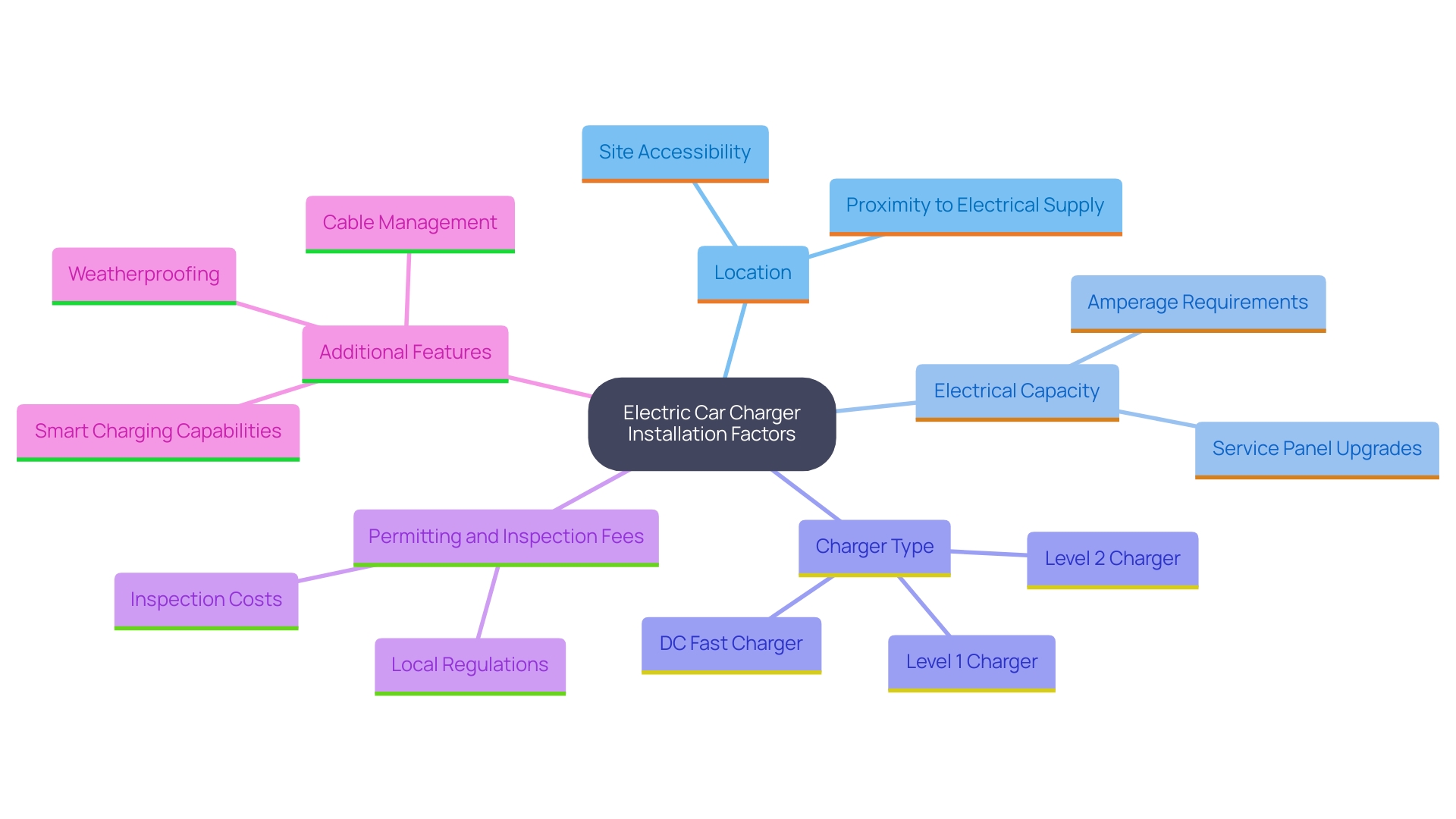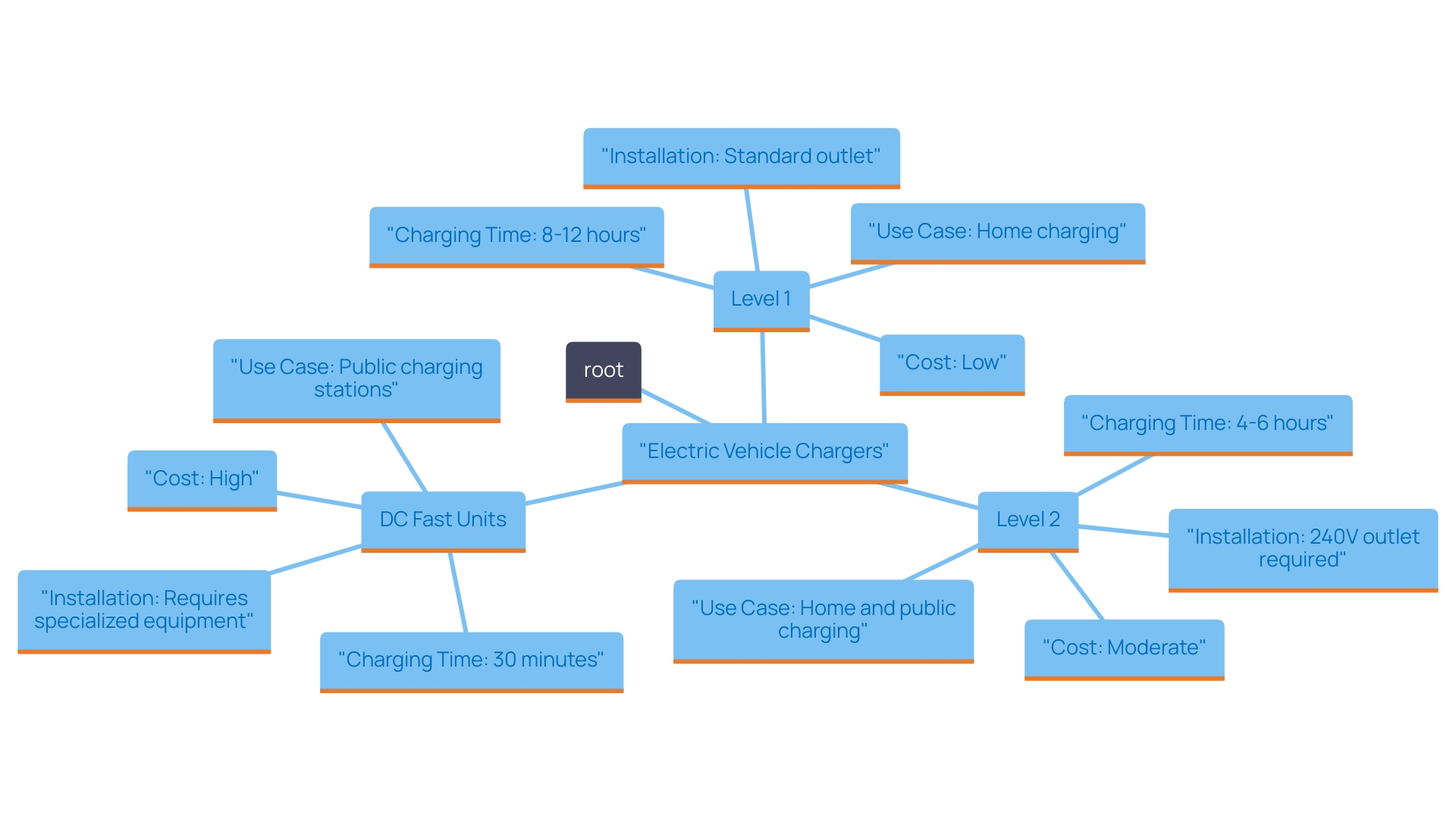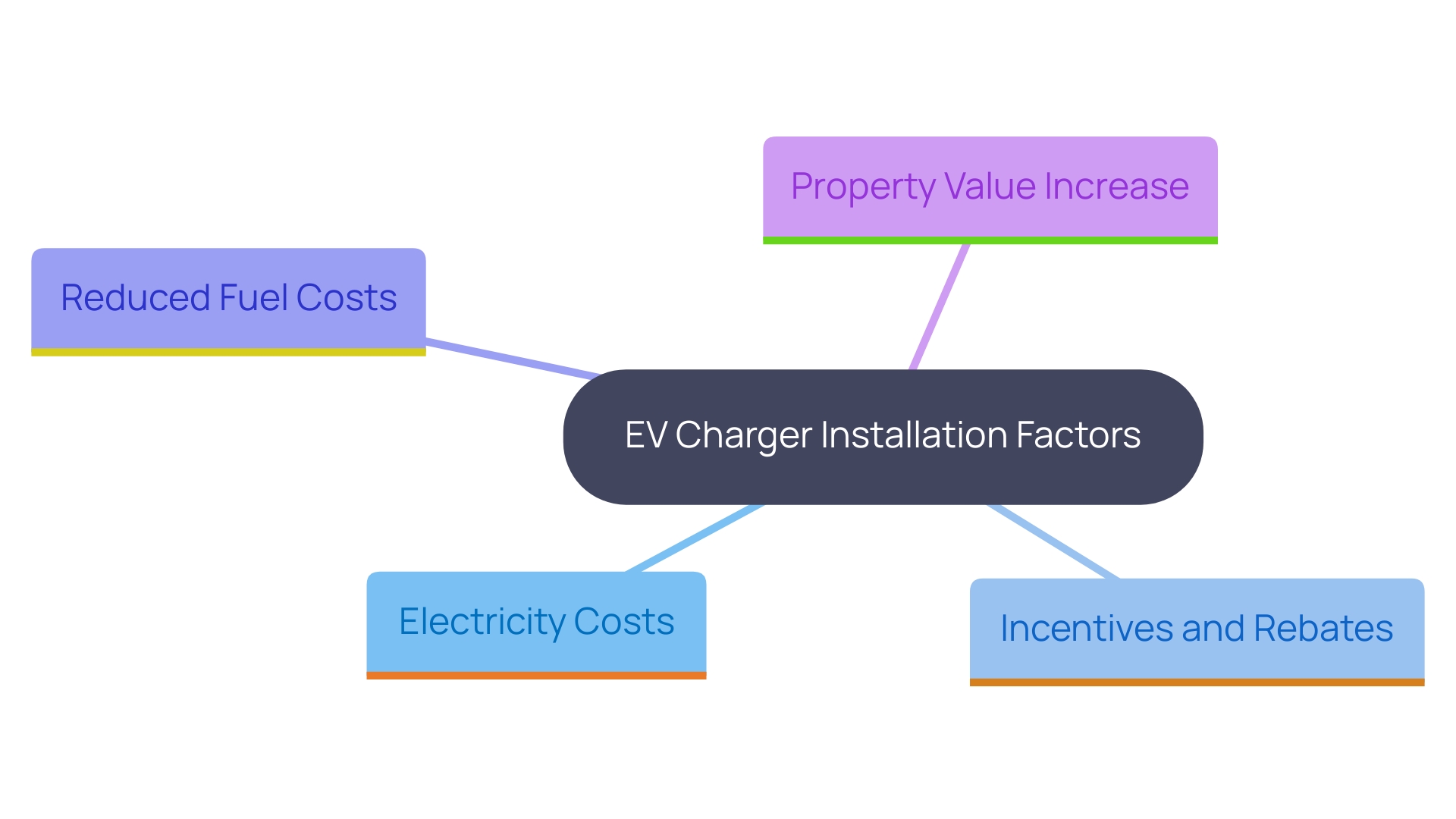Introduction
Installing an electric car charger at home is a significant step towards embracing sustainable living and reducing reliance on fossil fuels. However, the journey to get there can feel overwhelming, especially with so many factors to consider. From the type of charger that best suits daily driving habits to the hidden costs of installation, understanding the ins and outs of this process is essential for homeowners looking to make informed decisions.
As electric vehicles continue to gain popularity, knowing how to navigate the installation landscape can not only enhance convenience but also add value to a property. With expert guidance and a clear breakdown of costs, homeowners can confidently transition to electric vehicle charging, ensuring they are well-equipped for the future of transportation.
Understanding the Factors Influencing Electric Car Charger Installation Costs
When you’re considering installing an electric car charger at home, several important factors come into play:
-
Location: The distance between your electrical panel and the setup site significantly impacts labor and material costs. If your power source location is far from the panel, you’ll need additional wiring and labor, which can raise expenses. Our team at Powercore Electric can evaluate your residence layout to provide the most efficient installation plan.
-
Electrical Capacity: If your home has an older electrical panel, you might need to upgrade it to accommodate a new device. This upgrade can represent a significant expense, so it’s crucial to assess your current electrical system beforehand. We can assess your panel’s capacity and suggest necessary enhancements to ensure compatibility with your new device.
-
Charger Type: The kind of power source you select—whether it’s a Level 1, Level 2, or DC fast option—impacts setup requirements and expenses. Level 2 devices are most common for home installations and typically need a 240-volt outlet to function optimally. Our specialists can assist you in choosing the right power supply for your needs.
-
Permitting and Inspection Fees: Local regulations might necessitate permits or inspections, increasing the overall expense. It’s a good idea to check with your municipality for specific requirements to avoid any surprises. Powercore Electric can handle this process for you, ensuring all necessary permits are obtained.
-
Additional Features: Intelligent power devices with connectivity options may have higher initial expenses but can provide extra convenience and energy management advantages, possibly saving you money in the long run. We can help you explore these options to find the best fit for your lifestyle.
Comprehending these factors aids homeowners in gaining a clearer view of the overall expense associated with installing an electric car charger. As the global EV charging station market, currently valued at $18.22 billion, is projected to grow significantly, it’s crucial to consider how these setup costs fit within this expanding landscape. The shift from gas stations to EV charging stations illustrates a major change in customer experience, emphasizing the need for reliable and personalized service, which we at Powercore Electric are committed to providing.
With Powercore Electric Inc. at your side, you can rely on our expertise in solar panels, battery backups, and EV charging setups. We prioritize customer satisfaction and offer comprehensive support from consultation to installation. Ready to explore your options? Contact us today for more information, and let us help you navigate the transition to electric vehicle charging with confidence and clarity.
Exploring Different Types of Electric Car Chargers and Their Costs
When it comes to charging your electric vehicle at home, you have three main types of chargers to consider:
-
Level 1 Devices: These units connect to a standard 120-volt outlet, making them the most affordable option. With setup expenses typically varying from $300 to $600, they’re gentle on the budget. However, the trade-off is longer charging times, making them perfect for overnight charging.
-
Level 2 Devices: For individuals seeking a balance between expense and efficiency, Level 2 devices are the preferred option. They require a 240-volt outlet and typically cost between $1,000 to $2,500, including installation. This more precise range helps clarify the investment needed. These devices can significantly reduce charging time, which is ideal for daily use. In fact, upgrading from a Level 1 to a Level 2 device can reduce charging times by up to 75%, offering great convenience for regular commuters. It’s important to note that the setup of Level 2 units may require an electrical panel upgrade to accommodate the higher voltage.
-
DC Fast Units: These are the powerhouses of EV power sources, mostly used in commercial settings due to their hefty price tag of over $10,000 and the need for specialized electrical systems, such as higher capacity wiring and dedicated circuits. They can provide 60 to 80 miles of range in only 20 minutes, but their high price and intricate installation demands render them unsuitable for most residential users.
When selecting a power supply, consider your daily driving habits, how often you charge at home, and the electrical capacity of your home. For many, investing in a Level 2 device strikes the right balance between expense and convenience, making daily EV life effortless. In summary, while Level 1 devices are budget-friendly, Level 2 units offer a more efficient solution for regular use, and DC Fast Systems provide rapid charging but come with significant expenses and setup challenges. Upgrading to faster charging options can transform your EV experience, making it more efficient and hassle-free.
If you’re thinking about setting up an EV charger at your residence, Powercore Electric Inc. is here to assist. We provide a variety of services, including EV charging station setup, solar panels, and battery backups. Our skilled group can assist you throughout the setup procedure, guaranteeing your residence is prepared for your electric vehicle requirements. To learn more about how we can assist you in making your residence more eco-friendly, feel free to reach out to us at ryan.serrano@powercoreinc.net or call us at (916) 699-8778. Let’s work together to enhance your electric vehicle experience!
Assessing Additional Costs and Potential Savings
When planning for an electric vehicle charger installation, there are several important factors to keep in mind:
-
Electricity Costs: Charging your EV at your residence will naturally increase your electricity bill. Depending on local rates and driving habits, this additional cost typically ranges from $30 to $60 per month. For instance, vehicles with ranges below 200 miles may require up to 20 charging sessions annually at public stations, emphasizing the convenience and cost-effectiveness of home charging.
-
Incentives and Rebates: Numerous states provide rebates or tax credits specifically for EV charger setups. For instance, federal tax incentives of up to $7,500 are accessible for specific EV models, greatly reducing setup costs. Numerous regional initiatives also exist; for example, California offers rebates through the California Electric Vehicle Infrastructure Project (CALeVIP), which can cover a part of installation expenses. It’s worth checking both local and federal resources for the latest incentives available in your area.
-
Reduced Fuel Costs: One of the major advantages of electric vehicles is their lower fueling costs compared to traditional gasoline cars. Over time, this can result in substantial savings, particularly for those who frequently travel long distances. As Donald Hillebrand, director of the Argonne National Laboratory’s energy systems division, points out, this could be a boon for EV sales and vice versa.
-
Property Value Increase: Installing an EV station can also boost your residence’s market value. According to recent studies, homes with EV chargers can see a value increase of up to 4%, making your property more appealing in the real estate market. With the growing number of eco-conscious buyers, having a built-in charging station offers a significant advantage.
Along with these factors, Powercore Electric Inc. is here to assist you in managing the setup process. We offer comprehensive solutions for homeowners, including the installation of solar panels and battery backups, which can further enhance your energy efficiency and savings. By evaluating these extra expenses and possible savings, homeowners can gain a clearer insight into the long-term financial advantages of investing in an electric vehicle charging station. Not only does it offer convenience and cost savings, but it also adds value to your home, aligning with the increasing demand for sustainable living options. For more details on our services or to begin with your EV setup, feel free to reach out to us at Powercore Electric Inc. – your friendly neighborhood expert in sustainable energy solutions!
Choosing a Qualified Installer
When it comes to choosing an installer for your EV charger, consider the following steps to ensure a safe and efficient installation:
-
Research Credentials: Locate electricians who are licensed, insured, and experienced with EV socket setups. Reading online reviews and ratings can give you a good sense of their reputation. As Amy R. shared, ‘Highly recommend!! Exceptional service and price. Tom was very helpful, a really nice straightforward guy who definitely cares about his clients.’ At Powercore Electric, we pride ourselves on our reliability and commitment to customer satisfaction, ensuring you receive high-quality service tailored to your needs.
-
Get Multiple Quotes: Don’t settle for the first quote you receive. Gathering estimates from several installers allows you to compare costs and services offered, ensuring you get the best value for your money. Typically, employing skilled EV power point installers can vary from $800 to $2,500, based on the difficulty of the setup and regional labor costs. Factors such as the type of charger and the distance from your electrical panel can influence pricing as well. Powercore Electric provides transparent pricing and various options to fit your budget while delivering unmatched quality craftsmanship.
-
Inquire About Warranty and Support: Ensure the installer provides guarantees on their work and offers continued assistance for any problems that may occur after setup. A reliable installer, like Powercore Electric, should be willing to assist you even after the project is completed, ensuring peace of mind and continued satisfaction.
-
Inquire About Experience with Permits: A knowledgeable installer should be well-versed in local regulations and capable of handling the permitting process on your behalf. For instance, understanding the specific requirements in your area can prevent delays and ensure compliance with local building codes and state-specific energy policies. At Powercore Electric, our local expertise means we navigate these processes efficiently for you.
-
Seek Recommendations: Ask friends, family, or members of local EV clubs for recommendations of trustworthy installers who have delivered excellent service. Powercore Electric has built a strong reputation within the community, which is reflected in our numerous positive testimonials from satisfied customers. As John D. remarked, ‘Powercore did an excellent job with my setup.’ They were professional, timely, and the quality of work was top-notch!
By following these steps and considering Powercore Electric for your installation needs, you can confidently choose a qualified installer, ensuring your EV charger is installed safely and efficiently, while contributing to a sustainable future. Ready to get started? Contact Powercore Electric today for your free, personalized estimate!
Conclusion
Navigating the world of electric car charger installation can seem daunting, but understanding the key factors involved makes the process much more manageable. Highlighting the importance of location, electrical capacity, and the type of charger selected ensures homeowners can make informed decisions that align with their needs. Additionally, being aware of potential costs, including electricity expenses and available incentives, can significantly impact the overall investment and long-term savings associated with electric vehicle ownership.
Choosing the right charger is just the beginning; finding a qualified installer is crucial for a successful setup. By researching credentials, obtaining multiple quotes, and ensuring ongoing support, homeowners can rest assured that their installation will be handled with care and expertise. With the growing demand for electric vehicles, the added value of having a charger at home not only enhances convenience but also contributes positively to property value.
Ultimately, the transition to electric vehicle charging is a step towards a more sustainable lifestyle. By embracing this change, homeowners not only reduce their carbon footprint but also position themselves at the forefront of the evolving transportation landscape. The journey may have its complexities, but with the right information and support, the shift to electric vehicle charging can be a rewarding and enriching experience.




